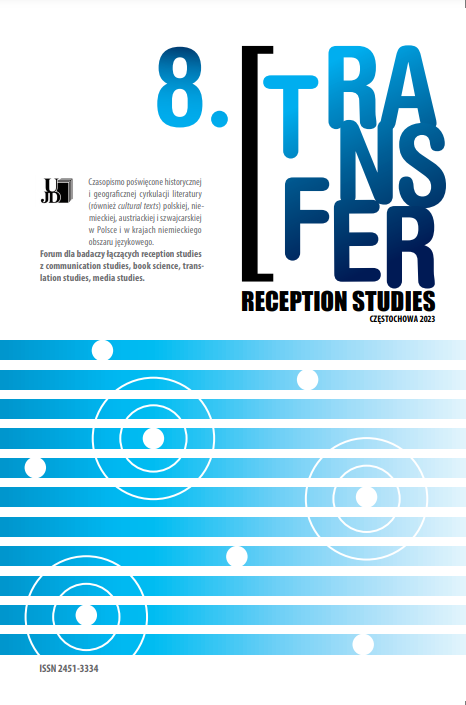How the Helvetians Discovered Waldenburg: The Reception of Joanna Bator in Switzerland
Abstract
Between 2011 and 2016, translations of three Waldenburg novels, Piaskowa Góra, Chmurdalia, and Ciemno, prawie noc, appeared successfully on the Swiss book market; the article aims to examine Joanna Bator's reception in Switzerland during that time. In 2014, Bator was awarded the Literary Award Leuk and the Friedrich Dürrenmatt Award from the University of Bern, which along with the addition of many positive critical reviews, indicate an overall appreciation for her literary output.
While the Waldenburg scenery and the vicissitudes of the expellees create a remarkable background for Bator's gripping plots, her novels - written from a feminist point of view - break taboos. She is acknowledged as a writer who crosses sociocultural borders, including those of sex and race. Bator has been praised for her postmodernist skill in combining hybrid genres and literary conventions. Also, she has been highly praised for her adeptness in handling vivid language along with a notable ability at switching through levels of time and space.
The online media and its feedback that have been observed and analyzed in this article indicate that Bator's Waldenburg novels have garnered both enthusiastic literary critics as well as readers. Therefore, it is very likely that in Switzerland the reception of Joanna Bator's next novels will be equally well-received.
Keywords:
Joanna Bator, reception, Waldenburg novels, The Literary Award Leuk, The Friedrich Dürrenmatt AwardReferences
References
Bator J., Chmurdalia, W.A.B., Warszawa 2010. Google Scholar
Bator J., Ciemno, prawie noc, W.A.B., Warszawa 2012. Google Scholar
[Blog:] Muromez, April 2016, https://muromez.com/ [letzter Zugriff: 20.05.2017]. Google Scholar
[Blog:] schiefgelesen, Mai 2016, https://schiefgelesen.net./ [letzter Zugriff: 20.05.2017]. Google Scholar
Debout sur le Mont-de Sable. Trois générations de femmes disent la Pologne d’ après guerre, „Le Temps“, 27.08.2014, URL: https://www.letemps.ch/culture/2014/08/27/debout-mont-sable-trois-generations-femmesdisent-pologne-apres-guerre [letzter Zugriff: 7.05.2017]. Google Scholar
Ebel M., Starke Frauen, harte Geschichten, „Tages Anzeiger“, 8.07.2014, URL: http://www.tagesanzeiger.ch/kultur/buecher/Starke-Frauen-harteGeschichten-/story/23719025 [letzter Zugriff: 7.05.2017]. Google Scholar
Ein Ensemble der unvergesslichen Figuren, „Börsenblatt. Das Portal der Bücherbranche“, 18.06.2014, URL: https://www.boersenblatt.net/artikelspycher__literaturpreis_leuk_2014_an_joanna_bator.803176.html [letzter Zugriff: 7.05.2017]. Google Scholar
„Ensuite, Kulturmagazin online“, 19.06.2014, URL: http://www.ensuite.ch/ [letzter Zugriff: 7.05.2017] . Google Scholar
Hirsbrunner F., Radio Sendung (SRF), 5.06.2016. Google Scholar
Jung S., Heimat am Horizont, „Schweizer Monat. Die Autorenzeitschrift für Politik, Wirtschaft und Kultur“, September 2014, URL: https://www.schweizermonat.ch/subscription_visitor/heimat-am-horizont [letzter Zugriff: 7.05.2017]. Google Scholar
Kijowska M., Im Labyrinth eines Plattenbaus, „Neue Zürcher Zeitung“, 7.06.2011, URL: https://www.nzz.ch/im_labyrinth_eines_plattenbaus1.10840772 [letzter Zugriff: 7.05.2017]. Google Scholar
Kijowska M., Mörder, Schatzsucher, Katzenfresser, „Neue Zürcher Zeitung“, 16.06.2016, URL: https://www.nzz.ch/feuilleton/buecher/joannabators-duester-grotesker-roman-dunkel-fast-nacht-moerderschatzsucher-katzenfresser-ld.89229 [letzter Zugriff: 7.05.2017]. Google Scholar
Kommentiertes Vorlesungsverzeichnis, Universität Bern, Herbst 2014. Google Scholar
Leuk, Literaturpreis für Joanna Bator, Radio Rottu Oberwallis, 30.08.2014. Google Scholar
pd, Berner Friedrich-Dürrenmatt-Gastprofessur. Berufung von Joanna Bator, „Neue Zürcher Zeitung“, Feuilleton online, 19.06.2014, URL: https://www.nzz.ch/feuilleton/berufung-von-joanna-bator-1.18325846 [letzter Zugriff: 7.05.2017]. Google Scholar
Peine S., Brandaktueller Kommentar, „Luzerner Zeitung“, 23.07.2017, URL: https://www.luzernerzeitung.ch/importe/fupep/neue_lz/lz_kultur/Brandaktueller-Kommentar;art128769,785951 [letzter Zugriff: 7.05.2017]. Google Scholar
Plath J., Basiatörtchen ohne Lindenblütentee, „Neue Zürcher Zeitung“, 26.08.2016, URL: https://www.nzz.ch/feuilleton/buecher/joannabator-und-die-polnische-provinzstadt-walbrzych-basiatoertchen-ohnelindenbluetentee-ld.113065 [letzter Zugriff: 7.05.2017]. Google Scholar
Radisch I. (Moderatorin), Literaturklub SRF, 24.05.2011. Google Scholar
Schmid U.M., Ein weiblicher Odysseus. „Wolkenfern“ – Joanna Bator führt Polen in die weite Welt hinaus, „Neue Züricher Zeitung“, 8.02.2014, S. 75. Google Scholar
Sury A., Monsterjägerin, Marathonläuferin, „Der Bund“, 26.12.2014, URL: http://www.derbund.ch/kultur/diverses/MonsterjaegerinMarathonlaeuferin/story/29069431 [letzter Zugriff: 7.05.2017]. Google Scholar
Sury A., Polnische Literatin bringt Berner Studenten Godzilla näher, „Der Bund“, URL: http://www.derbund.ch/bern/stadt/Polnische-Literatinbringt-Berner-Studenten-Godzilla-naeher/story/15600857 [letzter Zugriff: 7.05.2017]. Google Scholar
Wodecka D., Joanna Bator i jej mroczna bliźniaczka z Ząbkowic Sląskich, Gazeta Wyborcza.pl., Wrocław, URL: http://wyborcza.pl/1.75248.21126317, joanna-bator-przestalam-byc-nomada.html [letzter Zugriff: 7.05.2017]. Google Scholar
Zagajewski A., Lekka przesada, Wydawnictwo a5, Kraków 2011. Google Scholar
Statistics
Abstract views: 57PDF downloads: 24
Similar Articles
- Marta KAŹMIERCZAK, What Can the Intertextual Paradigm Yield to Translation Studies - An East European Perspective , Transfer. Reception Studies: Vol. 2 (2017)
- Monika Wolting, Exil, Migration, Flucht und Vertreibung, Alte und Neue Kriege – Literarische Topoi des 20. und 21. Jahrhunderts, section at the IVG Congress, University of Palermo, 27-30 July 2021 – Conference report , Transfer. Reception Studies: Vol. 6 (2021): AFFECTS 2 - CONTEMPORARY CULTURE OF EMOTIONS. TRANSFER. TRANSLATION. RECEPTION
- Joanna ŁAWNIKOWSKA-KOPER, „Lilith spotyka Kalliope. Austria czyta, dyskutuje i tłumaczy” – międzynarodowa konferencja naukowa i warsztaty, Opole 1–11.04.2018 , Transfer. Reception Studies: Vol. 3 (2018)
- Tobiasz JANIKOWSKI, The German-Polish „Potsdam” Border as Source of Imagination and Emotionalizing , Transfer. Reception Studies: Vol. 3 (2018)
- Dana Radler, ‘TOUCHED’ BY HUMOUR IN LIFE: CHARACTERS IN JOHN MCGAHERN’S FICTION , Transfer. Reception Studies: Vol. 5 (2020)
- Gabriela Jelitto-Piechulik, ‘Wise’ laugth as an educative measure. Ricarda Huch’s novella Teufeleien , Transfer. Reception Studies: Vol. 5 (2020)
- Elżbieta HURNIK, Franz Kafka letters to Milena Jesenská and Felice Bauer. Areas of intimacy , Transfer. Reception Studies: Vol. 3 (2018)
- Monika Wolting, Matthias NAWRAT , Enduring Ambiguity: What Is European Literature? Matthias Nawrat in Conversation with Monika Woltig , Transfer. Reception Studies: Vol. 4 (2019)
- Monika Wolting, Artur Becker, Who Is and Who Should Be a European? Cosmopolitan? Monika Wolting Talks with Artur Becker , Transfer. Reception Studies: Vol. 4 (2019)
- Ewa JAROSZ-SIENKIEWICZ, Karl Dedecius – The Post Mortem Recognition Tribute , Transfer. Reception Studies: Vol. 4 (2019)
You may also start an advanced similarity search for this article.

